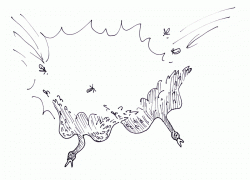No crow: Birds can avoid mid-air crashes
Q. Do birds collide? If not, why not? –A. Hale
A. "Early one morning, at the start of duck hunting season, I was standing waist-deep in a swamp when two black swans flew overhead, one from the south and one from the north-east," reported a New Scientist magazine reader from Victoria, Australia.
"As they got closer and closer, I thought, 'They're going to hit each other.' Then I decided, 'No, birds don't crash.' Poof! They collided in a cloud of feathers, dropping a few meters (several yards), then had a shake and flew on as if nothing had happened."
Birds do collide, stressed the magazine's editor. But, interestingly, there are no reports of collisions between birds that fly in formation, such as starlings. "From an evolutionary perspective, it would seem to make sense for flocking birds to have collision-avoidance systems," he wrote.
Q. Is your smartphone smarter than a fifth grader? –A. G. Bell
A. It took half a century to shrink the mainframe from the size of a living room to that of a suitcase, then another decade to make it smaller than a wallet, says Joshua Romero in IEEE Spectrum magazine. "Today's smartphones are a marvel of engineering," assimilating functionality from music players, remote controls, gaming consoles, even printed maps and news publications. So those fifth graders have met their match, right along with the rest of us.
Smartphones are becoming as essential as keys or a wallet, and they'll soon replace those as well. Not only are these highly personal devices always on, they're always somewhere on us. Users now stay connected to information at any given time or location, so it's there when you need it, said Qualcomm engineer and editor Dilip Krishnaswamy.
But the downside here is the addictive effect of always-on connectivity, adds Romero. Blackberries are rightly nicknamed "Crackberries" for the way they feed the workaholic's addiction. And not everyone likes it when others interrupt dinner to fact-check the conversation.
Some experts even worry about a new digital divide between those who can afford smartphones and those who can't, since many smartphones cost more than low-end computers.
Q. In 2000, an Indian Airlines flight was hijacked and diverted to Afghanistan, with the passengers confined in the plane for more than a week. Afterward, some of them were heard to say about the hijackers, "They were not bad people." What was going on here? –H. Karzai
A. The "Stockholm syndrome" occurs when hostages begin to identify with their captors, says Anu Garg in The Dord, the Diglot, and an Avocado or Two. In 1973, following a botched robbery attempt, the perpetrator held four employees of a Stockholm bank in the vault. When police attempted a rescue, they were surprised to discover that the hostages were afraid of them and resisted rescue! The four had bonded with the robber (a prison escapee) and started to sympathize with him. Later, they established a defense fund for him and testified on his behalf, and one female hostage even continued seeing him after he was imprisoned.
Why people might begin to identify with their tormentors is one of the mysteries of the human mind.
"If someone threatens to shoot and then doesn't, perhaps he's done us a sort of favor, the mind apparently rationalizes,” Garg writes. “In a place devoid of external contacts, the view of reality becomes distorted, and the victims may develop a fondness for the person with the power of life and death over them."
~
Send Strange questions to brothers Bill and Rich at [email protected]
